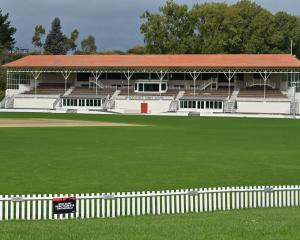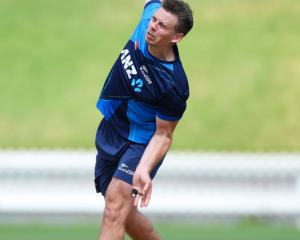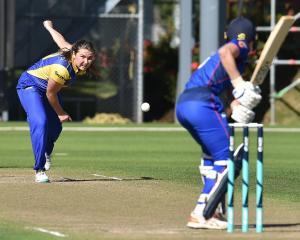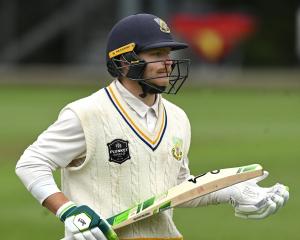With the Cricket World Cup getting under way next month, sports writer Adrian Seconi revisits some of the more memorable, odd and even mysterious moments.
NO, NO, NO
What was Mike Gatting thinking? Long before the reverse sweep was part of a batsman's standard repertoire, the England captain chose the final of the 1987 World Cup to play what was then considered a stunningly audacious and, as it panned out, ill-conceived shot.
Australia had made a competitive 253 for five but, with Gatting on 41, England was in control of the chase until he top-edged said reverse sweep. The worse thing is the same shot had got Gatting out in the semifinal. Slow learner.
LEVEROCK'S LEAP
Bermuda had precious little to celebrate at its debut World Cup in 2007 but it provided one of the tournament's most memorable moments when chubby police officer Dwayne Leverock, weighing in at about 130kg, dived sharply to his right and pulled in a wonderful catch. The chunky slipper had moved with such grace and unexpected athleticism it captured the world's attention and proved a great distraction from a huge mismatch. India went on to win by 257 runs after posting 413 for five. Well, at least that is what is recorded in the almanack. All anyone remembers is the big fella sailing through the air.
WAUGH DECLARED
''You've just dropped the World Cup, Mate'' Steve Waugh DID NOT say when South African Herschelle Gibbs dropped a regulation catch at mid-wicket during a Super Six in 1999. The Australian captain was on 56 when he was put down and went on to score an undefeated century to help win the game.
Waugh never said what was attributed to him, which is a shame, because it would have proved visionary.
Australia's win meant it played South Africa - again - in the semifinal. That match was tied and Australia progressed, thanks to its earlier win against the Proteas.
Gibbs, by the way, made the catch only to fumble it in his rush to celebrate by tossing it high into the air. SPEED DEMONBrisk. Express. Swift. Rapid. None do justice to the pace Shoaib Akhtar was able to generate during the 2003 World Cup.
The Pakistani had cracked the 100mph (160kmh) barrier in New Zealand a year earlier but a problem with one of the speed guns meant it was not recognised.
Australian Brett Lee was also capable of producing thunderbolts of frightening pace but Akhtar wanted it more. In a pool A game he sent a 100.23mph -161.3kmh - delivery hurtling towards England's Nick Knight.
It was a victory for Akhtar, of sorts, but Pakistan was well-beaten.
HOW MANY?
Controversy and confusion dominated the final moments of semifinal between South Africa and England in 1992. South Africa needed 22 from 13 balls but a shower swept across the Sydney Cricket Ground. About 10 minutes were lost and when played resumed South Africa needed 21 from one delivery, although the scoreboard at the ground showed the target as 22 from one. Either way it was impossible. Don't blame Mr Duckworth or Mr Lewis - it was the most productive overs method which was employed to come up with the revised target. That system was ditched in Australia as a result of the incident. But what people tend to forget about that game is South Africa's over rate had been so sluggish it only got through 45 of the planned 50 overs, therefore robbing England of the opportunity of posting a more significant tally.
Had the Duckworth-Lewis method been used, South Africa would have had to score 26 runs from one ball.
WHODUNNIT?
Bob Woolmer's death still remains a mystery. The Pakistan coach was found dead in his hotel room on March 18, 2007. It was the day after Pakistan's surprise defeat by Ireland at the World Cup. Jamaican police initially believed Woolmer had been murdered but back-tracked on earlier statements he had been strangled, concluding he died from natural causes. At the inquest in November, the jury found there was insufficient evidence to rule out murder or natural causes. As we said, it is a mystery.
THE DARK AGES
Did you see the last rites of the 2007 final between Australia and Sri Lanka? Of course you didn't - no-one did.
The final three overs were played in darkness, thanks to an umpiring blunder.
Sri Lanka was chasing a revised target of 269 from 36 overs when poor light forced the players from the field. Sri Lanka (206 for seven) was well behind on the Duckworth-Lewis target and the Australians started celebrating. But the umpires erred, announcing everyone would have to come back the next day because it was bad light, not rain, which had brought play to a premature end.
Sri Lanka needed an unlikely 63 runs, so the captain Mahela Jayawardene said his team would resume batting if Australia agreed spinners would complete the innings.
Sri Lanka added a further nine runs - apparently. No-one who was there could see the tip of their nose, let alone the cricket.












